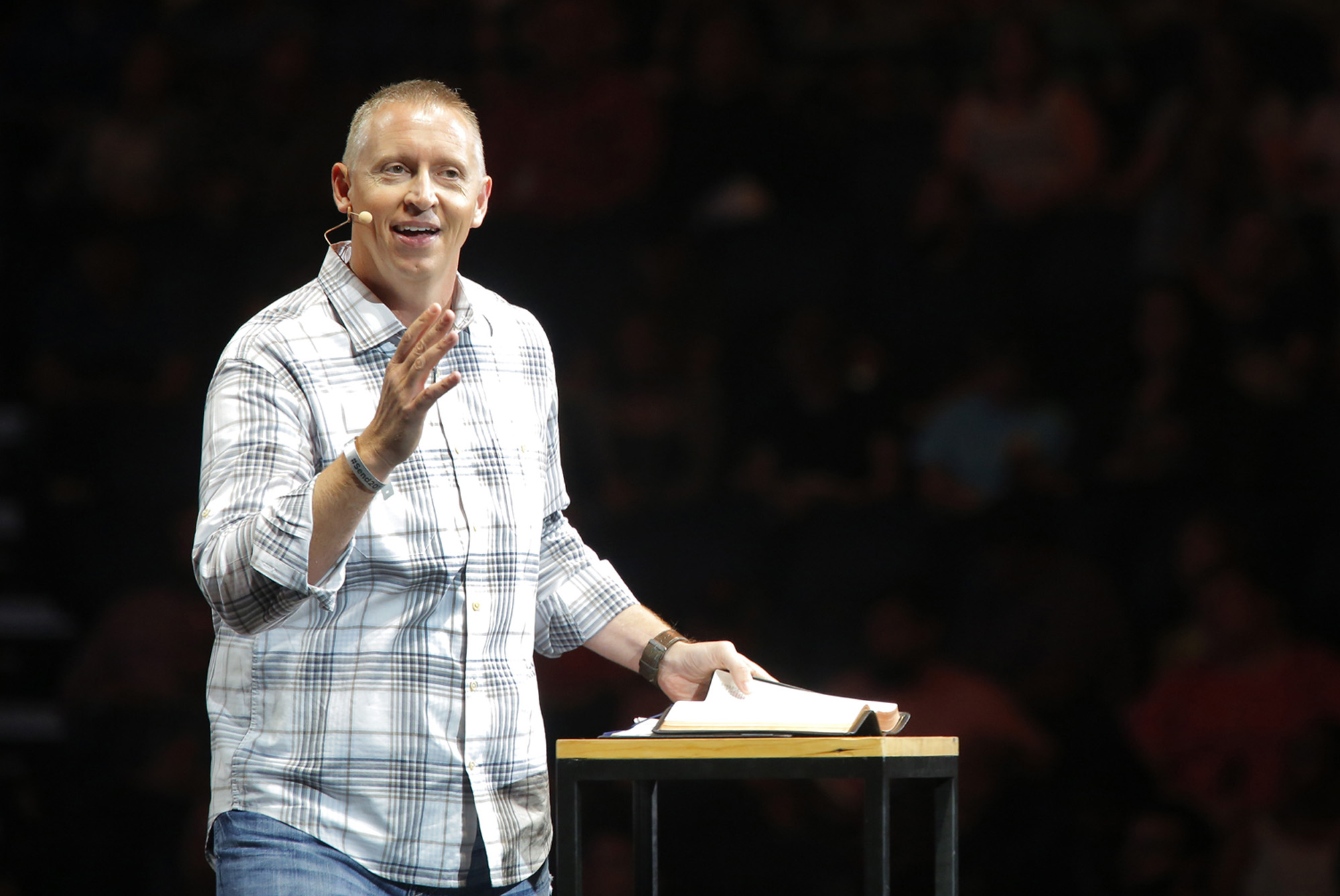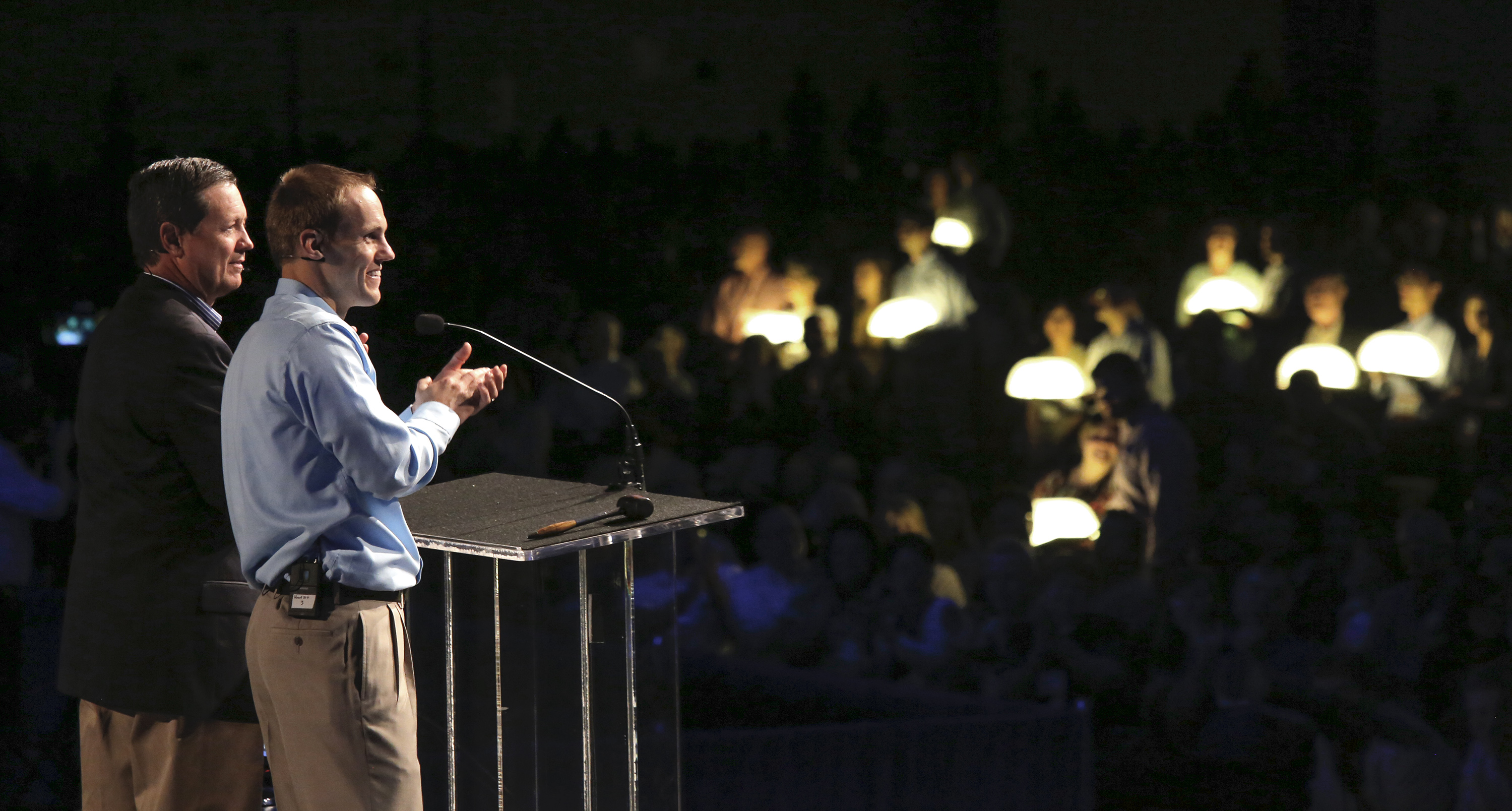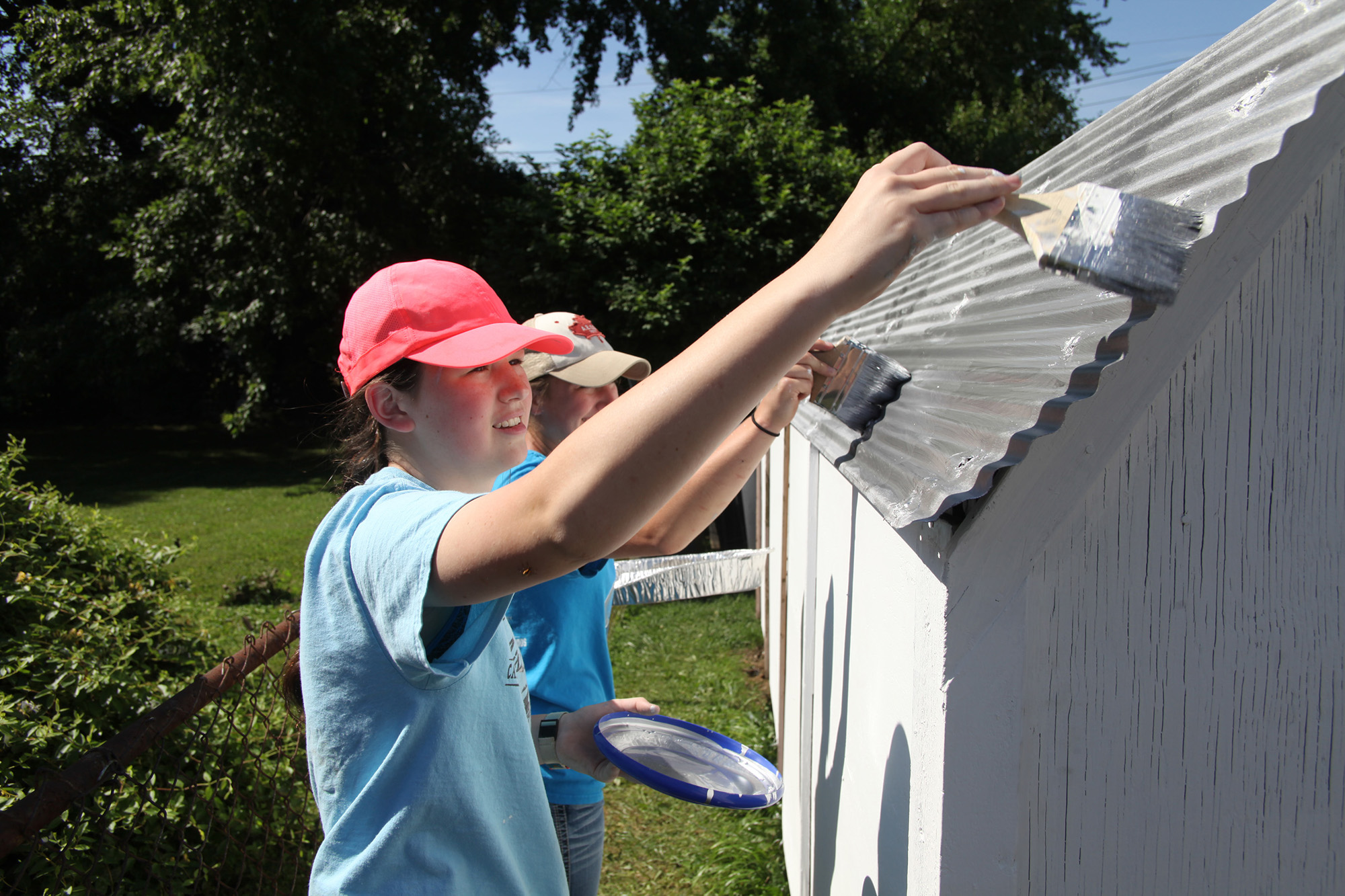
ST. LOUIS (BP) — Questions were posed to four Southern Baptist Convention entity presidents during time allotted for messengers’ questions during the leaders’ respective reports at the June 14-15 SBC annual meeting in St. Louis.
Following are accounts of the four entity presidents’ responses. Not all entity presidents were asked questions.
Ethics & Religious Liberty Commission
Russell Moore, president of the Ethics & Religious Liberty Commission, responded to two questions at the end of his report.
John Wofford, pastor of Armorel Baptist Church in Blytheville, Ark., questioned how someone in the SBC “can support the defending of rights for Muslims to construct mosques in the United States when these people threaten our very way of existence as Christians in America.”
Moore responded that it is not a difficult issue. “What it means to be a Baptist is to support soul freedom for everybody,” the ERLC leader said.
“[W]hen you have a government that says, ‘We can decide whether or not a house of worship is being constructed based upon the theological beliefs of that house of worship,’ then there are going to be Southern Baptist churches in San Francisco and New York and throughout this country who are not going to be able to build,” Moore said.
The greater issue is not self-interest but the Gospel of Jesus, he told the convention.
Having a government with “the power to outlaw people from assembling together” and confessing their beliefs “does not turn people into Christians,” Moore said. “That turns people into pretend Christians, and it sends them straight to hell. The answer to Islam is not government power. The answer is the Gospel of Jesus Christ and the new birth that comes from that.”
In May, the ERLC and the International Mission Board defended religious freedom for all in a friend-of-the-court brief in support of a Muslim community in New Jersey that has been prevented by the local government from building a mosque.
In the second question posed to Moore during his report, Jason Dees, senior pastor of Valleydale Baptist Church in Birmingham, Ala., asked how the ERLC is engaged in foster care and adoption issues.
The ERLC is fighting for religious liberty for Christian organizations to serve orphans according to their convictions, Moore told the messengers. It also is seeking to equip church leaders to talk to congregations about adoption and foster care, he said.
What pastors and other leaders should say is: “Everybody in the body of Christ is called to minister to widows and orphans in their distress — everybody,” Moore said, citing a variety of ways church members can be involved in such ministry. “We all have a [role] to play in this. We simply have to have pastors and leaders who are standing up and putting it on the table.”
North American Mission Board
Allen Calkins, pastor of First Baptist Church in Gray Summit, Mo., asked Kevin Ezell, president of the North American Mission Board: “Given the fact that NAMB is not part of the prime directive of the Southern Baptist Convention, which is international missions, why should NAMB continue to be spending the amount of Cooperative Program funds it does on domestic projects that are also being carried out by state conventions and Baptist associations? Can we still afford to spend Cooperative Program dollars on these redundant efforts when we have had to lay off over a thousand missionaries?”
Ezell answered: “As [IMB President] David Platt would tell you, 100 percent of the funding of the International Mission Board comes from North America. The stronger our churches are, and the more churches we have in North America, the stronger our ability is to go to into the uttermost parts of the earth. It is both/and, not either/or. We believe, and we can see, even from the class of 2010 — when I say class I mean just the churches that were planted in 2010 — last year gave over $3 million to missions. A state exec [executive director] in a Northeast state recently told me that if we do not continue to plant churches we will not exist. The world has come to us. We have to be strong all over North America, not only to reach this country, but it is imperative if we are going to reach the world. If our churches go down — and we are decreasing, we lose 800 to 1,000 churches as an SBC convention every year – [we will go down]. We are trying to plant 1,200 churches just to keep breaking even. We believe the stronger North America is, the stronger everything will be as we try to reach the world for Christ.”
International Mission Board
Dennis Shaw, a messenger from Huntsville Baptist Church in Yadkinville, N.C., and director of missions for the Yadkin Baptist Association, asked IMB President David Platt: “For those missionaries that have retired, who would I be able to contact to see if any of those retired missionaries are interested in doing interim, part-time vocational ministry in our churches?”
Platt answered that IMB established a transition team, which can be contacted at [email protected], to help missionaries transition from the field to places of service stateside. Platt encouraged Shaw to contact his state WMU, as WMU has been helpful in making such connections and has lists of missionaries who are nearby who have agreed to share their contact information with local churches. Platt also suggested contacting the state convention, noting how North Carolina has worked to set aside funding to fuel church planting among unreached peoples in the state. Or, Platt said, if neither of those avenues meet the need, the messenger can contact IMB directly.
In a second question posed to Platt, Aaron Colyer, lead pastor of First Baptist Church in Roswell, N.M., stated that he has a friend who is looking at a work contract with an oil and gas company in Asia and is asking whether any training is available for his potential move in 18 months.
Platt answered that training is available, and people can connect with IMB’s training team at [email protected] or online at training.imb.org. The mission board is exploring new ways for multitudes to go overseas, and “especially as we investigate ways to send more people, we in no way want to lower the bar,” Platt said. “We don’t want to dilute our mission force, so we want to be sure to provide good, strong, biblical, ecclesiological, missiological training.” That means IMB needs to customize training for professionals who don’t have eight weeks to come to IMB for training like traditional missionaries have done, he said, noting that IMB has created weekend modules and six-month curriculum for training Christians who are going overseas.
LifeWay Christian Resources
Scott White, a messenger from First Baptist Church in Broken Arrow, Okla., asked LifeWay President Thom S. Rainer to explain the process used to review authors and books sold at LifeWay Christian Stores.
Rainer said publishers do not even present LifeWay with many books, because they understand LifeWay’s biblical standards.
“But there are times when a book will be presented to us that goes to a theological review, which is a team of people who look at a book and ask if it passes the theological vetting,” Rainer said.
“If there are still questions, and particularly if there is some type of controversy over a book, many times it will even come to the executive level, and we will make the decision.”
In a second question posed to Rainer, Kyle Howard, a messenger from Immanuel Baptist Church in Louisville, Ky., prefaced the question expressing appreciation for LifeWay.
“LifeWay has been instrumental in my own sanctification and of many people I know,” Howard said before asking Rainer if LifeWay sells books by health, wealth and prosperity gospel preachers that he described as poisonous to the African-American community.
Rainer answered firmly, “We do not intentionally have health, wealth and fame authors.”
“We look at every book individually,” Rainer continued. “If in the past [an author] has had some type of relationship with that type of theology, we will look at it closely. But in the event the book passes our theological grid, we put it on the shelf.”
Reiterating that LifeWay does not sell prosperity gospel books, Rainer assured messengers, “We are doing our very, very best. We’ll make mistakes, and we’ll hear from you when we do.”



















